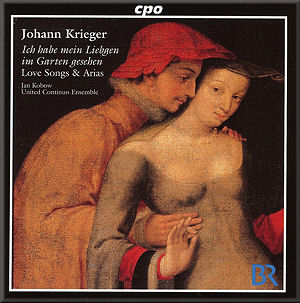 |
 |
|


alternatively
CD:
AmazonUK
AmazonUS
|
Johann KRIEGER (1651
- 1735)
Geistliche Arien und weltliche Lieder aus Neue musicalische
Ergätzlichkeit (1684)
Auf die Kirch-Weihe [6:10]
Oster-Andacht [5:01]
Vor der Trauung [3:58]
Lasst uns freuen* [1:47]
Ihr Freunde, fragt ihr noch [1:33]
Kömmt wir wollen ausspazieren [1:46]
Lasst mich in der Einsamkeit [2:39]
Es ist mir von Natur gegeben [3:05]
Ihr angenehmen Leute* [1:51]
Ich habe mein Liebgen im Garten gesehen [6:08]
Ich traue nicht [2:26]
Die Losung ist Geld [1:54]
Neu Jahrs-Andacht [6:37]
Auff ein Ernte-Fest [6:03]
Abend-Andacht [2:42]
Abend-Musick: Sei willkommen [5:06]
Philipp Friedrich BUCHNER (1614-1669)
Sonaten aus Plectrum Musicum Op. 4 (1662)
Sonate für 2 Violinen + Fagott [5:19]
Sonate für 2 Violinen [4:02]
Sonate für Violine + Fagott [3:57]
 Jan Kobow (tenor), Julia von Landsberg*
(soprano) Jan Kobow (tenor), Julia von Landsberg*
(soprano)
United Continuo Ensemble
rec. Kapelle Schloss eehaus, 7-9 August, 2006
sung texts and English translations enclosed
 CPO 777 433-2 [71:01] CPO 777 433-2 [71:01]  |
|
|
Johann Krieger may not be one of the more prominent
baroque composers but like his two years older brother Johann
Philipp, he is at
least something more than a footnote in the annals of music.
He was born in Nuremberg and served for some years in Bayreuth
and Graz before in 1682 settling in Zittau, where he spent the
rest of his life. He seems to have been especially revered for
his keyboard compositions and Handel approached him so much that
he took a copy of Krieger’s Anmuthige Clavier-Übung to
England. He is reputed to have produced large quantities
of vocal music, most of which apparently have been lost. No operas
have been preserved and of his 225 cantatas only thirty remain.
That he was well equipped to write for the human voice is however
very clear when one listens to the songs and arias from Neue
musicalische Ergätzlichkeit. The texts were written
by Zittau born Christian Weise (1642 - 1708). He was a teacher
and in 1678 he was appointed principal at the Gymnasium in his
hometown. Today this institution bears his name. In 1679 he started
writing school comedies to be performed at the Carneval. Such
comedies often had musical inserts and after a while Krieger
got this task. In 1684 he published a collection of such settings
and it is from this collection the songs on this disc have been
chosen.
Weise was an excellent poet, something that Gotthold Ephraim
half a century after Weise’s death pointed out, finding
parallels even with Shakespeare. Fact is that the texts performed
here are unusually witty, often humoristic, sometimes satirical.
Considering that 325 years have passed since they were written,
they are surprisingly modern and they express feelings and situations
in a way that makes the reader feel that the late 17th century
wasn’t too unlike our present world.
Even the music feels extremely fresh with captivating rhythms
and catchy melodies, some of them probably inspired by folk songs
of the day. The United Continuo Ensemble, playing on period instruments,
have specialized in basso continuo instruments in their cooperation
with singers, dancers, actors and other instrumentalists. They
work well here and there is true heft when they are joined by
the two trumpets in a couple of numbers.
Jan Kobow has emerged as one of the most outstanding German lyric
tenor lately. His Die schöne Müllerin some years
ago was one of my Recordings of the Year, a disc in the Naxos
Complete Schubert Edition was also very successful and Haydn’s Die
Schöpfung for the same company, where he was the excellent
tenor soloist, almost swept the board with the competition. Quite
recently he also appeared as operetta singer in Lehár’s Die
blaue Mazur. He also appears on another dozen recordings
for CPO. It is a beautiful voice, flexible, elegant, honeyed
when needed and, first and foremost, his enunciation is exemplary.
Even without the printed texts every syllable can be heard with
the utmost clarity. To this must be added that he can express
the meaning of the text, colour the tone - in sum: he is a superb interpreter.
The first three titles are sacred arias and they are more or
less solemn but with a nice twist every so often. Then follows
two groups of secular songs, and they are gorgeous. Ihr Freunde, fragt
ihr noch, lively and rhythmic, followed attacca by Kömmt
wir wollen ausspazieren, where Kobow indulges in some charming
whistling at the end, are just appetizing starters. The real
treats are found in the second secular group, where Ich habe
mein Liebgen im Garten gesehen is so extremely beautiful
and Kobow sings it with marvellous tone. The fast and rhythmic Ich
traue nicht is intensely dramatic and has some fearsome runs,
while the ironic Die Losung ist Geld erases more than
three centuries: money was then and is today the solution! For
the concluding group we are back where we started: with some
sacred arias, of which Neu Jahrs-Andacht has the singer
rejoicing the arrival of Jesus to the New Year, and the Abend-Musick is
a festive conclusion, employing the full band with trumpets and
timpani.
Soprano Julia von Landsberg appears in two numbers and sings
well and the recording is atmospheric. On their own the ensemble
play three sonatas by Philipp Friedrich Buchner, who was a generation
older than Krieger. It is nice and varied music and ideal resting
points between the groups of songs. The main attraction is however
Krieger’s secular songs and they are certainly my baroque
discovery of the year. This is a disc that shouldn’t be
missed by any lover of vocal music from the 17th and
18th centuries.
Göran Forsling
|
|












